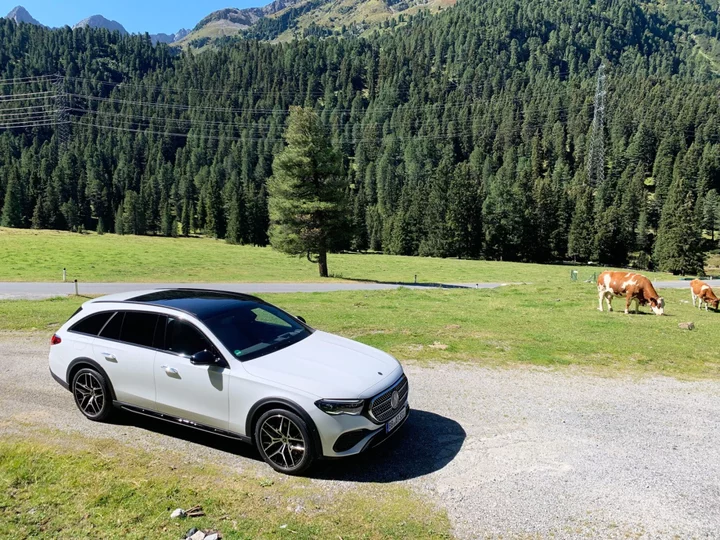Wagons remain a niche segment in the American market, even though so many car critics profess to love them it’s a bit of an industry joke.
But the popularity of crossovers and small SUVs, which afford automakers better margins and consumers better ride heights (the higher the car the closer to God?), means the humble wagon is a disappearing breed.
Many of those left in production are made in Germany. (See also: Porsche, Audi.) The E-Class All-Terrain debuted at Munich’s IAA auto show earlier this month and will arrive at US dealerships in mid-2024. Pricing has yet to be announced. As I drove from Munich to Brixen, Italy, I knew certain friends would already be asking: What makes it different from a regular wagon, anyway? How good is it?
After taking it 350 miles through the Dolomite mountains, I found the new All-Terrain to be a satisfying second act to the German automaker’s elegant midsize sedan. It’s a more spacious, more capable variant of the car targeted at upper-middle-class families, without having to go full SUV.
A More Rugged Wagon
The 2024 Mercedes-Benz E-Class All-Terrain is the wagon version of Mercedes’ most popular model for decades, the E-Class sedan.
But this All-Terrain is bigger and more capable than its predecessor. It’s slightly longer than the E-Class sedan and more than an inch wider than the previous E-Class All-Terrain, which means a few more inches of elbow, knee and leg room for anyone sitting in the back seats. The luggage area can be expanded from 21.7 to 64.6 cubic feet.
More important for anyone considering taking it down a rocky path, the Off-Road mode adds almost an inch of clearance compared with the E-Class, for roughly 7 total inches of height over the ground. It’s not enough to take on King of the Hammers, but it’s perfect for driving over light snow, dirt and gravel.
Mercedes has beefed up the exterior as well. Wheel arches are clad in dark gray protective material—that’s to help protect against scratching from trees and bushes as the car drives by. Side sills have a distinctive chrome strip that helps prevent scratching and scuffs; sport pedals come in stainless steel. It also has special bumpers, with extra chrome, and rear guards that protect against rubbing on uneven terrain. Optional 20-inch wheels on the white one I drove and roof rails added to the no-nonsense look.
That’s Also More Advanced
During my time in the car, the E-Class All-Terrain was fun to drive, full stop—not “fun for a wagon.” From the Andaz Hotel in Munich, I headed south, aiming for a charming family-run health resort called Santre but stopping for lunch at a popular motorcycle destination called Top Mountain Cross Point. Sat just near the crux of a killer switchback before the Italian border, the diner-like joint with a raging fire in the fireplace and gondola access also names itself as the home of Europe’s highest-elevation motorcycle museum. (I recommend the spaetzle.)
Back in the car, a six-cylinder, 375-horsepower engine (plus 23hp boost) and all-wheel drive worked in eloquent tandem as I wound through snow-dusted mountain passes, dodging German camper vans and loose livestock (horses, cows, sheep, hitchhikers) along the way. I settled in Sport for its combination of agile, tight steering and throaty acceleration. A Comfort mode automatically lowered the car 0.6 inches when I hit 75 mph to reduce wind resistance and improve fuel efficiency.
It’ll do zero to 60 mph in 4.6 seconds and has a top speed of 130 mph, which doesn’t touch the fastest things I’ve seen on the unregulated sections of the autobahn, but it’ll more than do in the rest of the world. Only the E 450 4MATIC version of the All-Terrain, like the kind I drove, will come to the US. Japan will get an additional diesel option.
As I sledded my way along the edges of Bavaria, the Cure and Dave blasted on the Burmester 4D surround sound system. I turned on the most intense version of the massaging wellness program. (It’s not that intense.) I fiddled with the power sunroof (too much sun) and dove for lose euros in the center console to pay periodic highway tolls.
The amount of technology offered in this car astounded me more than anything else. It has a compatibility layer that allows you to install apps such as TikTok, Angry Birds and even Zoom, though I didn’t take any video calls during my Bavarian jaunt. A new entertainment portal offers video streaming, on-demand content, local video programs, sports, news and games on the central and optional passenger display. There’s a selfie and video camera on top of the dashboard.
These work only when the car isn’t moving. An updated intelligent voice control system activates any time you say “Hey Mercedes” and ask it to ID things like, say, that decrepit but obviously historic castle you just drove past. It’ll also find restaurants, recount weather forecasts and control the audio system. You don’t even have to talk weird and stilted for it to work.
Sometimes all the tech felt a bit overboard. I had mixed feelings about the digital key I used that lets drivers unlock the car when synced with an iPhone or Apple Watch, though those were more hypothetical than real. (If my phone dies or gets lost or hacked, I’d just use the normal fob key to unlock the car.)
What I didn’t need was the throbbing light strip that lined the cabin and pulsated in beat with whatever music I had playing at the moment. The seatbacks vibrated in time to the beat, too; it felt odd to literally feel the beat of Roxette’s “She’s Got the Look” bumping through my seat against my back as I whizzed down the tree-lined road. I channeled an older German Frau I had driven past, who was knitting in a lawn chair under the late summer sun. She looked so placid! These chaotic effects were more suited to a flashy Maybach, not this German toboggan begging to be filled with ski gear and dogs.
I confirmed later that the beatbox effects can be disabled through the multimedia display, thank goodness. With a wagon this sensible, nothing should distract from the joy of the drive.









